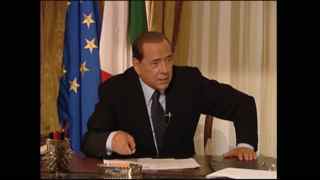 After 25 years and nearly 30 trials, Italy's former prime minister Silvio Berlusconi has for the first time been handed a definitive sentence by the country's highest court.
After 25 years and nearly 30 trials, Italy's former prime minister Silvio Berlusconi has for the first time been handed a definitive sentence by the country's highest court.
The three-time-former premier was found guilty of tax fraud and given a four-year sentence -- of which he will serve only one year due to an amnesty aimed at cutting down on prison overcrowding.
The high court also ordered a lower court to reconsider whether Berlusconi should be banned from public office. Prosecutors had been seeking a five-year ban, but the lower court will have to review this part of the sentence, and will probably issue a three-year ban.
So what happens next? Once the sentence goes into effect in a few days, Berlusconi will have 30 days to decide how he wants to serve the one-year sentence. Jail isn't an option given that the former premier is aged 76, so the choice is between house arrest, and more likely, community service.
Then there is the question of whether Berlusconi, a member of Italy's Senate, is eligible for public office, now that he's been convicted of a crime. According to Italy's anti-corruption law, which was passed by Mario Monti's government in late 2012, Berlusconi will be ineligible to hold public office after he serves this sentence, independent of the outcome of the review by the lower court.
The Italian Senate will need to decide when Berlusconi's ineligibility begins. Does it apply immediately, which would result in him stepping down as a senator? Or does it apply after the current parliamentary term? Either way, as things stand, Berlusconi cannot run for office.
Once the public office ban is reviewed and completes its judicial journey, which will take months, it too would need a Senate vote for immediate enforcement, which could ban Berlusconi from holding public office for the duration of the sentence.
So what political implications does all this have on Enrico Letta's government and Italy's immediate political future?
The Senate vote will be the first critical step and is bound to lead to a ferocious divide in Letta's delicate "grand coalition" government, which is comprised of center-left parties and Berlusconi's center-right PdL party.
Even if Berlusconi was ineligible for office, there is technically nothing to stop him leading the center-right in an election campaign without running for office. The latest example of this in Italy is Beppe Grillo, the comedian turned politician, who leads his Five Star Movement despite being banned from public office due to a conviction over a road accident.
If the center-right won an election, the political office ban could be changed with a simple majority in parliament -- and with ineligibility out of the way, Berlusconi could at least technically become prime minister for a fourth time once the law is abolished.
Simply put, Silvio Berlusconi is down but definitely not out. A video statement he released Thursday confirmed this and read like a call to battle and the beginning of yet another very long election campaign.
We're in uncharted territory, and what happens next politically is nearly impossible to predict. But the possible outcomes include the downfall of the government.
What is certain is that in both the center-left and the center-right there will now be immense internal pressure.
With some pushing for an early election as a "referendum on Berlusconi" -- 43 percent of voters in one SWG poll released Friday believe Berlusconi is being persecuted by magistrates -- and others trying to maintain calm in order to keep the government alive in the name of national interest, it will be a question of who blinks first.
Portland and Seattle
Free Subscription to Breaking News
Free Subscription to Breaking News






















































































































































































































































































































































